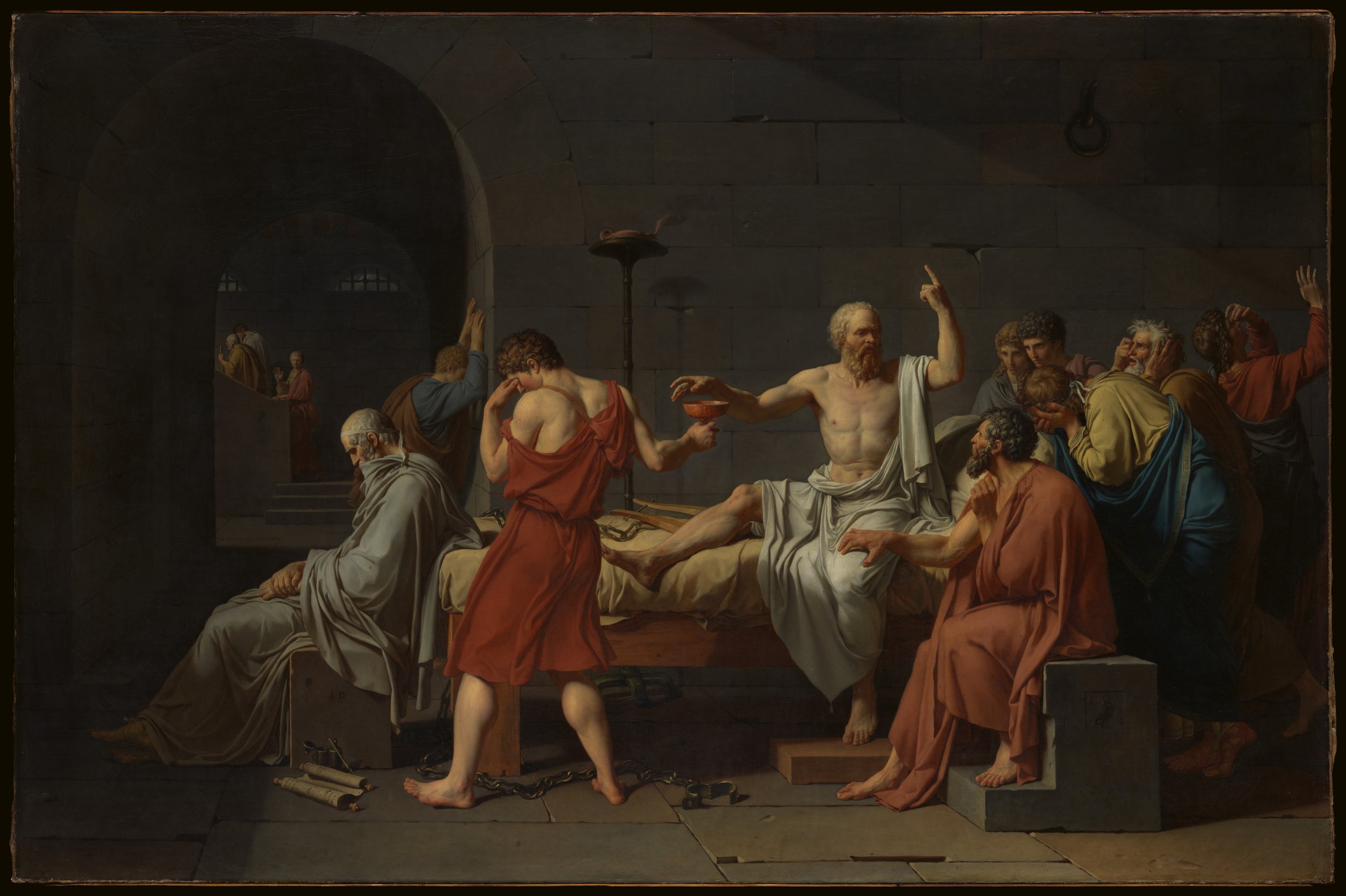I Can No Longer Come and Go: Parshat Va’Yelech & The Death of Socrates
The Death of Socrates, 1787, Jacques Louis David, on view at the MET Fifth Avenue in Gallery 614
וַיֵּ֖לֶךְ מֹשֶׁ֑ה וַיְדַבֵּ֛ר אֶת־הַדְּבָרִ֥ים הָאֵ֖לֶּה אֶל־כׇּל־יִשְׂרָאֵֽל׃
וַיֹּ֣אמֶר אֲלֵהֶ֗ם בֶּן־מֵאָה֩ וְעֶשְׂרִ֨ים שָׁנָ֤ה אָנֹכִי֙ הַיּ֔וֹם לֹא־אוּכַ֥ל ע֖וֹד לָצֵ֣את וְלָב֑וֹא וַֽיהֹוָה֙ אָמַ֣ר אֵלַ֔י לֹ֥א תַעֲבֹ֖ר אֶת־הַיַּרְדֵּ֥ן הַזֶּֽה׃
יְהֹוָ֨ה אֱלֹהֶ֜יךָ ה֣וּא ׀ עֹבֵ֣ר לְפָנֶ֗יךָ הֽוּא־יַשְׁמִ֞יד אֶת־הַגּוֹיִ֥ם הָאֵ֛לֶּה מִלְּפָנֶ֖יךָ וִירִשְׁתָּ֑ם יְהוֹשֻׁ֗עַ ה֚וּא עֹבֵ֣ר לְפָנֶ֔יךָ כַּאֲשֶׁ֖ר דִּבֶּ֥ר יְהֹוָֽה׃
Moses went and spoke these things to all Israel. He said to them: I am now one hundred and twenty years old, I can no longer come and go. Moreover, Hashem has said to me, “You shall not go across yonder Jordan.”
It is indeed your God, Hashem, who will cross over before you, and who will wipe out those nations from your path; and you shall dispossess them. —Joshua is the one who shall cross before you, as Hashem has spoken.
(Devarim 31:1-3)
וּמֹשֶׁ֗ה בֶּן־מֵאָ֧ה וְעֶשְׂרִ֛ים שָׁנָ֖ה בְּמֹת֑וֹ לֹא־כָהֲתָ֥ה עֵינ֖וֹ וְלֹא־נָ֥ס לֵחֹֽה׃
Moses was a hundred and twenty years old when he died; his eyes were undimmed and his vigor unabated.
(Devarim 34:7)
On the face of things, what we have before us is what we would expect of a departing leader to say to his people –
Explain that unfortunately he cannot continue with them forever;
God will continue to be with them;
There is a responsible leader who will take over.
But if we recall for a moment the earlier themes in Moshe’s addresses to Israel in Devarim, there seem to be a number of plaints that he seems to have uncharacteristically omitted: Now יהוה was angry with me on your account and swore that I should not cross the Jordan and enter the good land that your God יהוה is assigning you as a heritage.
For I must die in this land; I shall not cross the Jordan. But you will cross and take possession of that good land. (Devarim 4:21-22)
This rebuke to the tribes of Israel - by a leader who cannot but bring up the fact that he may not enter the promised land on their fault – actually appears in the Torah more than once. In fact, the explanation Moshe gives here for his exiting the scene - that he can no longer be active as a leader - is contradicted by one of the last verses of the Torah: “his eyes were undimmed and his vigor unabated”.
But here, at this point – the farewell address – all the past frustration with his people is absent. Did something change in Moshe facing his departure?
In The Death of Socrates by Jacques Louis David, (pictured above and below) the chalice of poison is about to be handed to Socrates by one of his disciples. In the background at the staircase walks his wife; her hand raised gesturing farewell, echoing her husband’s hand raised in the philosopher’s resolute idealism. But what does the noble figure, portrayed in the neo-classical style of David, stand for in the eyes of his wailing students?
The Death of Socrates grayscale study, 1782, Jacques Louis David, not currently on view.
Paradoxically, Socrates is imparting two opposing ideals to his followers – and to history – both at the same moment. On one hand, he has been tried and sentenced to death in Athens on charges of atheism and corrupting the youth. Of course, Socrates is not one to budge from his morality and his beliefs, and will take his independence of thought with him to his execution. On the other hand, he adamantly refuses offers of escape based on the injustice he perceives in flouting the laws of the state – even if the particular decision in his case is unjust. Socrates refutes the arguments of his friend Crito in the Platonic dialogue that carries that name).
Moshe has finished recounting the events and mistakes of the Jews’ sojourn in the desert. It is not the time anymore to discuss his tragedy of not being allowed to join his people in Israel. He must see to it that the collective of Am Yisrael survives the transfer of leadership to the next generation.
That the ideals of life in the presence of G-d continue. Any mention of personal complaint would put these goals at risk. All that is left for him to explain is the simple fact of his fate – “I can no longer come and go”.

